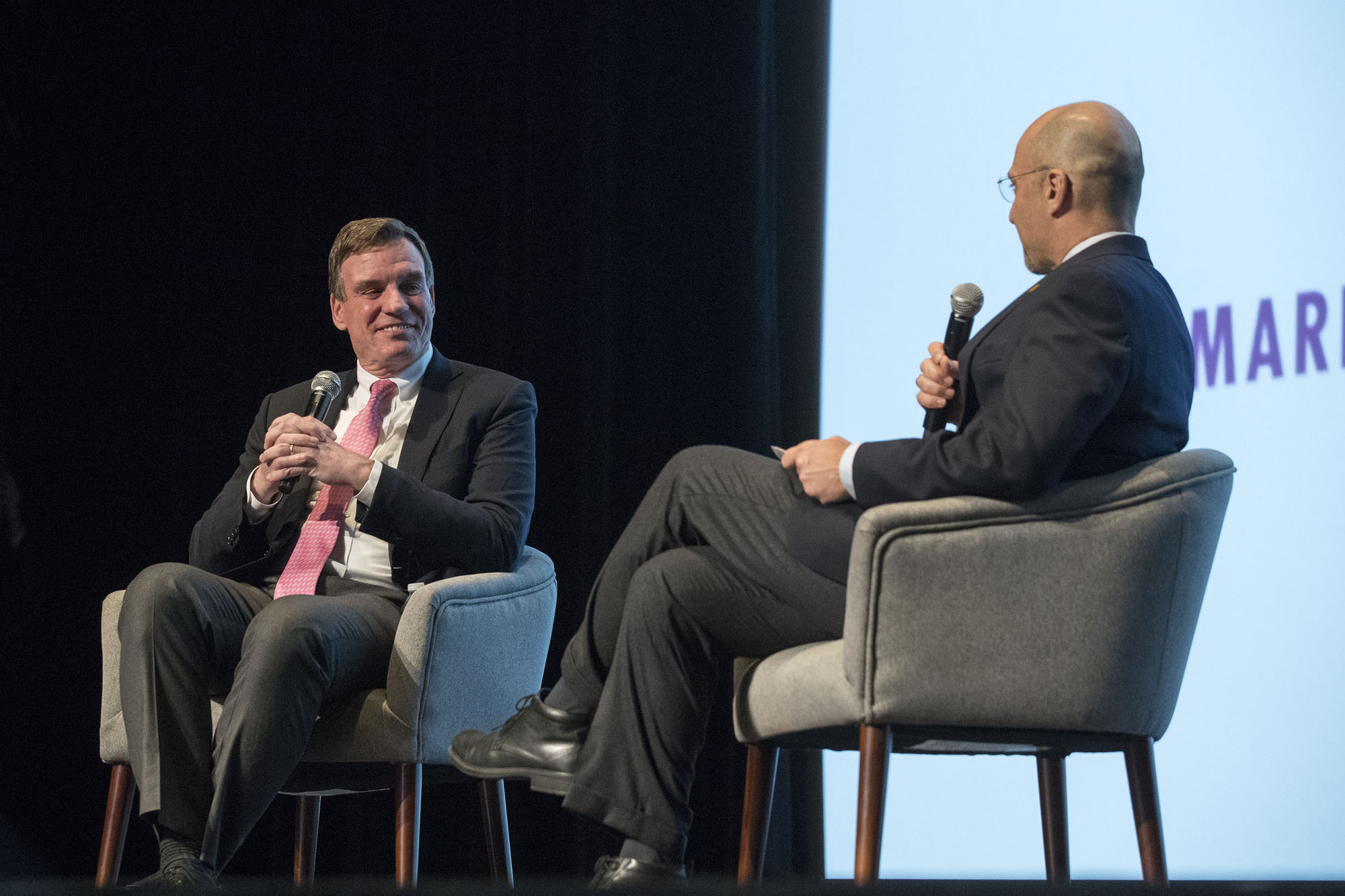Just two weeks shy of marking Donald Trump’s first 100 days in office, Americans of all political persuasions are looking for insight into the man they elected president and how he will continue to use the office. Thursday, the University of Virginia’s Miller Center assembled an all-star line-up of politicians, journalists and political historians to tackle some of the country’s most pressing questions about the Trump presidency.
“Innovations in Democracy: The First 100 Days of Trump,” was a three-part discussion, presented together with the Tom Tom Founder’s Festival and headlined by U.S. Sen. Mark Warner, a Virginia Democrat.
William Antholis, director and CEO of the Miller Center, joked in his introductory remarks that it was “the first Miller Center variety show that we’ve ever had.”

In addition to the opening keynote conversation between Antholis and Warner, the event included a historical analysis segment by hosts of the popular history podcast “BackStory” and a panel discussion featuring Peter Baker, the chief White House correspondent for the New York Times.
Antholis and Warner began the event by discussing evidence that the Russian government sought to influence the 2016 presidential election through hacking and manipulation of digital media. As vice chair of the Senate Intelligence Committee, Warner is leading one of the investigations into Russian activities during the election.
While Warner stressed the importance of uncovering the full extent of Russian efforts, he also advocated for a closer examination of the way Americans think about, and consume information in, the digital landscape.
“As somebody whose been longer in technology than I’ve been in politics, I think frankly, we have to have a whole reexamination of some of the companies that we have grown to depend upon,” he said. “I think some of the founders of Facebook and Twitter and Google are great individuals, but the notion that they are simply ‘pass-throughs’ on information and have no responsibility to curate, I think we have to rethink.”
Beyond Russian intervention, adaptation to the changing media landscape and concerns for the partisan echo chamber it seems to have created were ongoing topics throughout the evening.
The “BackStory” panel addressed how the proliferation of news sources has affected what kind of news is shared and how it’s expressed. Panelists included “BackStory” host and UVA professor of history Brian Balogh, “Backstory” host and University of Richmond President Emeritus Ed Ayers and Christa Dierksheide, a historian at the Robert H. Smith International Center for Jefferson Studies at Monticello.
Pointing back to the early days of television, the group explained how the competitive landscape forced a kind of moderation among the only three news channels.
“That’s a great example of a technological change that really supported far less partisanship because we only had three networks – ABC, NBC, CBS – for national news,” Balogh said. “So let’s do that math. If you are one of three networks, you have to get at least 33 percent of the populace to be in business. So all of the channels – I don’t mean to take anything away from Walter Cronkite here – but all of those channels hugged the middle.”
While the need to attract the broadest audience possible was useful in curtailing partisanship, the historians explained that it could also diminish coverage of critical topics that were distasteful to certain audiences. As an example, Balogh pointed to the networks’ limited coverage of certain aspects of the Civil Rights Movement for fear that it would turn away white audiences in the South.
In the final panel of the evening, Pulitzer Prize-winner and host of the Miller Center’s “American Forum” television show Douglass Blackmon spoke to participants about the changing nature of news coverage in the era of Trump. Along with the New York Times’ Baker, the panel included Nicole Miller, an assistant professor in presidential studies at the Miller Center and a contributing editor to U.S. News and World Report, and Russell Riley, co-chair of the Miller Center’s Presidential Oral History Program.
Asked about the president’s performance overall, Baker pointed to Trump’s ability to dominate the “above the fold” news in the Times and elsewhere on a regular basis.
“I think what he’s done most effectively and most clearly in this 84 days or so is to dominate the conversation,” he said. “All we talk about in Washington and other parts of the country is Donald Trump.”
The panelists further addressed recurring disagreements over when to take the president literally.
As part of the center’s Presidential Oral History Program, Riley has logged more than 1,000 hours interviewing former Cabinet officers and senior White House staff from administrations going back to President Jimmy Carter. Based on what he’s learned from those interviews, Riley explained that presidents quickly learn the perils of speaking off the cuff or without the expectation that listeners around the world are taking their every word literally.
“Presidents’ words are very powerful things,” he said. “A president who does not understand the power of his words is like a 6-year-old in possession of a handgun with a bullet it in. You may be able to get by without there being any problems whatsoever for an extended period of time, but at some point disaster could happen.”
In their concluding remarks and in answering audience questions, the panelists stressed a key theme of the event: the need for ordinary citizens to remain properly informed and engaged in order to uphold a robust democracy.
Warner summed up this call earlier in the night by addressing the fatigue many Americans are feeling with the near-constant political news cycle.
“As much as you want to throw a shoe at the TV when the news comes on, don’t do that,” he said. “Our system will only work if everybody participates, and if you tune out or tune off, all you do is turn the keys over to the wingnuts on either side of the political spectrum. Our country’s too good for that.”
Media Contact
Article Information
April 14, 2017
/content/sen-mark-warner-miller-center-experts-discuss-media-age-trump

